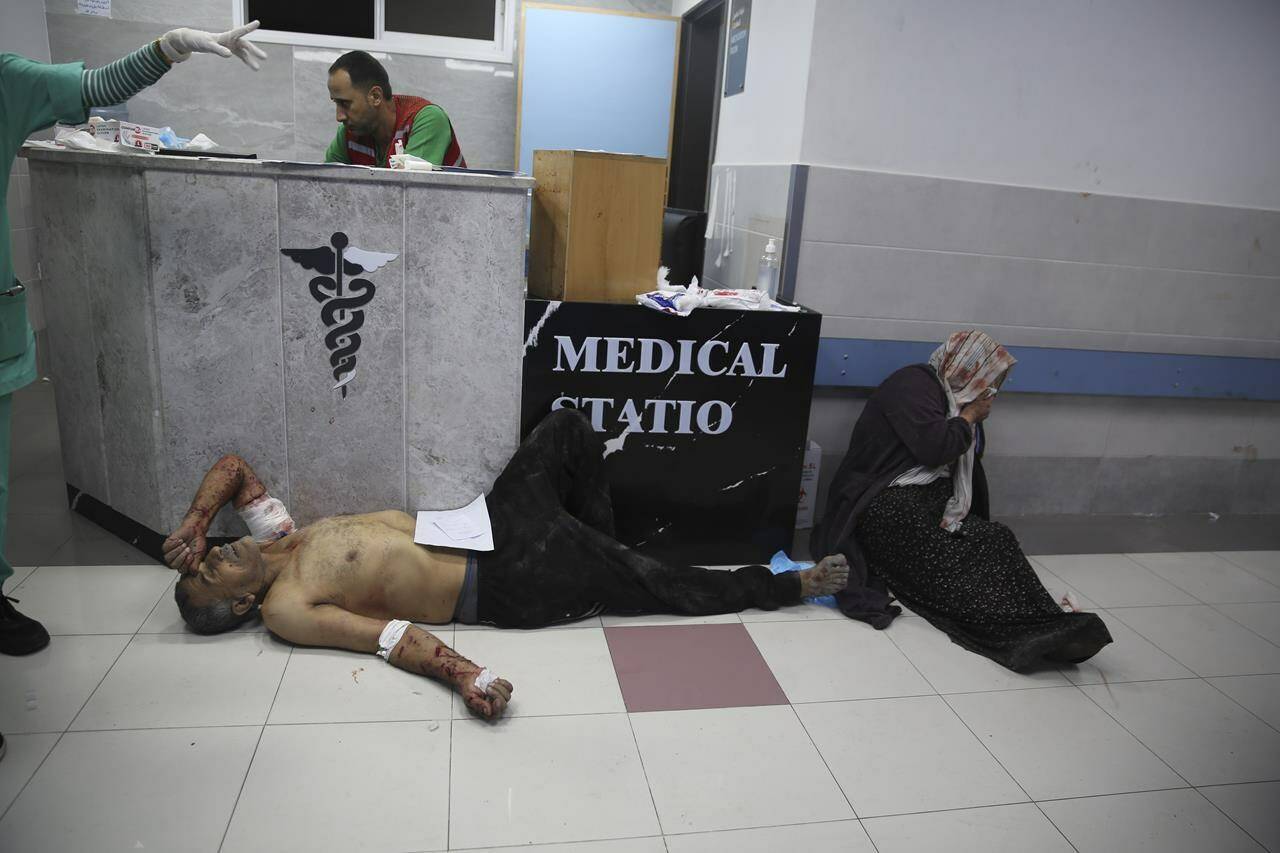Dr. Ehab Bader had travelled from London, Ont., to Gaza for a family visit, to see his aging parents.
Now trapped in the besieged Palestinian territory, he is volunteering at Gaza’s largest hospital, which is overwhelmed by people in urgent need of life-saving care as medical supplies run short.
“People are waiting outside, severely injured and sometimes you have to choose unfortunately, who do you serve,” the neonatologist told The Canadian Press, speaking from his parents’ home in Gaza City.
“It’s a difficult choice for those who work at the emergency room. The situation will be better described as catastrophic.”
Bader, 47, arrived in Gaza less than two weeks before Hamas militants crossed through Israel’s highly fortified separation fence and killed over 1,300 Israelis in a brutal rampage.
Israel’s military told about one million Palestinians to evacuate northern Gaza on Friday and head to the southern part of the sealed-off coastal enclave, an unprecedented order applying to nearly half the population ahead of an expected ground invasion against Hamas.
The order sparked panic among civilians and aid workers already running from a barrage of Israeli airstrikes, as the U.N. warned staging such an evacuation on a 24-hour deadline would be impossible and potentially calamitous.
The war has claimed at least 2,800 lives on both sides.
Bader said he was asked to volunteer at Shifa Hospital in Gaza City, where the morgue was overflowing, and workers had to stack corpses outside the walk-in cooler and put dozens more, side by side, in the parking lot.
Israel said that nothing would be allowed into Gaza until the release of around 150 hostages taken captive by Hamas.
Egypt says it has engaged in intensive talks with Israel and the United States to allow the delivery of aid and fuel to Gaza through its Rafah crossing point, which remained closed on both sides Thursday.
Bader said Canada and the broader international community need to raise their voices louder in calling for the creation of a humanitarian corridor that would allow food, water, and medicine to enter Gaza.
Shifa and other hospitals are desperately trying to save whatever diesel remains in their backup generators, turning off the lights in all hospital departments but the most essential — intensive care, operating rooms, oxygen stations.
Israeli Energy Minister Israel Katz has said, “Not a single electricity switch will be flipped on, not a single faucet will be turned on, and not a single fuel truck will enter until the Israeli hostages” Hamas militants captured from Israel are returned home.
Bader accused Israel of inflicting collective punishment on Palestinians in Gaza who played no role in the Hamas attack, insisting that ensuring access to medical supplies and other essentials for non-combatants should not be a subject of negotiation.
“If we are principled, we should ask ourselves, why we can’t help those who are trapped in Gaza Strip,” Bader said.
“A government like (Canada should) put enough and extra pressure, often, to stop this disaster. What’s going on in Gaza is a crime because we have no access to our basic needs.”
Israel has enforced a strict blockade of Gaza since 2007, the year Hamas took power in the coastal enclave. Egypt also tightly controls the flow of goods and people through the Rafah crossing.
A senior official with the International Committee of the Red Cross has warned that the lack of electricity could cripple hospitals, put newborns in incubators and elderly patients on oxygen at risk, and stop kidney dialysis and X-rays.
“Without electricity, hospitals risk turning into morgues,” said Fabrizio Carboni, ICRC’s regional director.
Bader said he has been surrounded by scenes of death and destruction. The beds at Shifa are full, with patients crowding the hallways.
He told The Canadian Press that he is not sure what he will do if given the chance to evacuate, expressing conflict about leaving Gazans in desperate need of help.
“So many like me are torn between our family, our relatives, our colleagues, our friends, our neighbours in Canada, and the family that we left behind,” Bader said.
– with files from The Associated Press.
This report by The Canadian Press was first published Oct. 13, 2023.
Fakiha Baig, The Canadian Press

